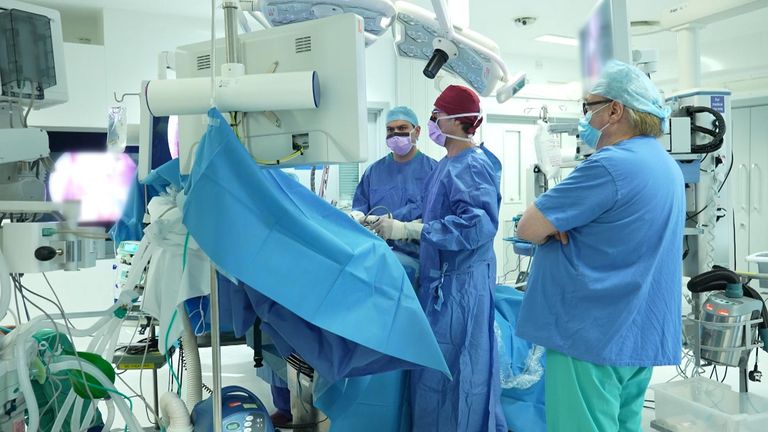A man who had heartburn that was so severe he would sometimes regurgitate his food has finally been cured with a “revolutionary” new surgical procedure.
Jeff Cohen had trouble swallowing more than a mouthful or two because acid had been rising up from his stomach for so long that it impaired the normal muscle contractions in his oesophagus, or gullet.
He told Sky News that it made eating, particularly in public, unpleasant.
“It would sit there, heavy in my chest, like a blockage,” he said.
“But now I can eat without having to worry. The food goes straight down, like normal.”
Mr Cohen was one of the first patients on the NHS to be implanted with a device called RefluxStop.
Surgeons at St Mary’s Hospital, part of Imperial College Healthcare, stitched the small cube of medical-grade silicone into a pouch on the outside of his stomach in a keyhole procedure that took little more than an hour.
The device holds the stomach and oesophagus in their proper positions so the muscular valve between them is able to work normally to allow food through but stop acid leaking out.
Mr Ahmed Ahmed, a consultant surgeon at the hospital, said the technique deals with the underlying cause of severe heartburn, or acid reflux.
“In most folks with reflux, the main issue is that the valve that stops the acid from going into your throat is in the wrong position.
“That’s what’s causing them to have reflux on a daily basis.
“In the new procedure, we put the valve back in the correct position, and then implant the RefluxStop to maintain the natural anatomy.”
Other surgical techniques constrict the bottom of the oesophagus to stop acid leaking from the stomach, but that can make swallowing more difficult, particularly in patients like Jeff with existing problems.
“For them, this [new procedure] is revolutionary because they will now be considered for surgery,” said Mr Ahmed.
Read more from Sky News:
The Christmas veggies that may help fight cancer
UK braces for new internet traffic record
Heartburn affects around a quarter of all adults in the UK, with over-indulgence during the festive period a common trigger.
According to NHS Digital, last Christmas one person viewed its online advice every 13 seconds.
Anyone with symptoms that continue for more than three to four weeks should see their GP because the acid can cause a condition that may lead to cancer.
Mild symptoms can be treated with over-the-counter medications to neutralise the acid. But prescription drugs may be needed for more severe cases.
Mr Ahmed said surgery should now be seen as an alternative to life-long drug treatment.
Jeff is now looking forward to the festive period for the first time in many years.
“This Christmas I’m going to be able to eat what I want,” he said.
“I’m going to have so many pigs-in-blankets on the side of my dinner that I wouldn’t have had last year.
“I can just get on with everyday life and I wasn’t able to do that before.”
